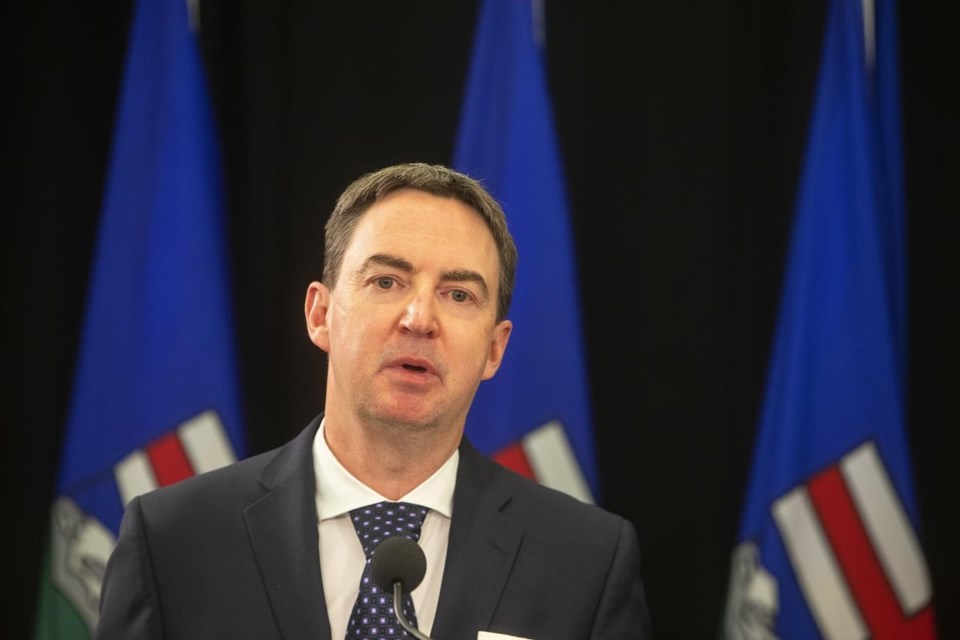EDMONTON — Alberta Premier Jason Kenney says his government has made strides in adding capacity to hospitals still straining to cope during the COVID-19 pandemic.
Kenney announced Friday that 19 of 50 new intensive care beds promised in the spring budget are now available.
He said once all 50 are open, Alberta will no longer have the lowest number of intensive care beds per capita, but will instead have among the average number in Canada.
“These beds are staffed with new registered nurses, health-care aides, unit clerks, respiratory therapists and other allied health professionals who will keep those beds open when needed,” Kenney said in Calgary.
“And when demand and pressure slows down, there’s flexibility to redeploy staff to other areas where needs for care and treatment are higher."
The 19 beds are spread among five cities: Edmonton, Calgary, Lethbridge, St. Albert and Grande Prairie.
Health Minister Jason Copping said even with the new beds hospitals remain under severe stress due to extra patients with COVID-19.
“The hospitals are full up and there are just a lot of new patients at the door every day in emergency,” Copping said.
He said hospitals in Edmonton and Calgary have been above 100 per cent occupancy in recent weeks.
“The pandemic is obviously a big factor in the surge of patients we are seeing right now,” Copping said.
“But the reality is our big metro hospitals have routinely run close to 100 per cent in the core units, and over 100 per cent at peak times, even before the pandemic.
“The system needs more capacity … so we’re adding that capacity.”
Heather Smith, head of the United Nurses of Alberta, said Kenney’s promise was short on specifics on hiring more nurses and failed to address core concerns on how to keep existing ones.
“Just buying hospital furniture won’t solve the problem,” Smith said. “Privatizing important aspects of health care and making health-care workers’ jobs less secure won’t help either.”
Smith said many nurses are exhausted from trying to keep the system going during the pandemic and are considering retiring or going to work somewhere else.
More supports are needed, she said.
“That will require treating nurses and their unions as essential contributors to the solutions Alberta needs, and no longer acting as if they are enemies,” she said.
The Opposition NDP said the province is treating a symptom while ignoring the core problem.
NDP critic Shannon Phillips said Alberta needs more family doctors, but the United Conservative Party government’s public fights with doctors and nurses over wages and working conditions have resulted in critical gaps in care.
“The UCP war on front-line professionals has created a profound crisis in health care,” said Phillips.
“Thanks to Jason Kenney and the UCP, we don’t have enough staff to operate the beds we already have, or the ambulances we already have or the primary care clinics we already have.”
Phillips said there are 21 communities where the hospital is partially closed due to staff shortages, along with long waits for care at children’s hospitals in Edmonton and Calgary.
“Part of the pressure that our hospitals and ambulances are under is caused by the serious damage Jason Kenney and the UCP have caused to primary care,” Phillips said.
“In my hometown of Lethbridge, there are more than 43,000 Albertans who can’t find a family doctor.”
Alberta had 173 ICU beds before the pandemic. But over the last two years, officials were forced to scramble staff and space to double that capacity to handle waves of critically ill Albertans due to COVID-19.
Kenney has previously said he and his government erred last year when they lifted almost all COVID-19 health restrictions before the summer and did not have a contingency plan for a possible COVID-19 resurgence.
Another COVID-19 wave happened that fall, forcing Kenney to later say the province came disturbingly close to having to impose triage protocols that would have forced physicians to decide who would receive life-saving care and who would not.
This report by The Canadian Press was first published May 13, 2022.
Dean Bennett, The Canadian Press




